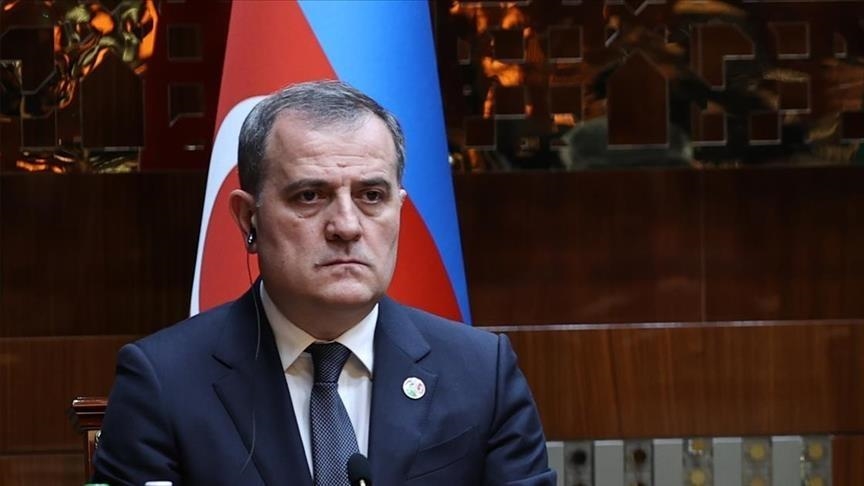Azerbaijani Foreign Minister Jeyhun Bayramov said on Monday that Armenia’s policies in the Karabakh region are among the most serious threats to regional peace and security.
“Armenia’s failure to withdraw its military units (from Karabakh) in contravention of its obligations, its obstruction of the opening of the Zangezur corridor with various excuses, its intention to interfere in Azerbaijan’s internal affairs under the guise of protecting the rights of Armenian residents in Karabakh… are among the most serious threats to peace and security in the region,” Bayramov said at a press conference with his Turkish counterpart Hakan Fidan in Ankara, Türkiye’s capital.
Bayramov said he and Fidan had the opportunity to exchange ideas on the process of Azerbaijani-Armenian normalization, adding that Baku and Ankara’s positions on it are based on international norms and principles.
Baku’s policies, he asserted, combined with Azerbaijan and Türkiye’s views and steps on the future of the region would ensure the safety and prosperity.
The positions of Azerbaijan and Türkiye on normalization with Armenia are “obvious,” he said, adding that such a process should not be held hostage by Yerevan’s “occupation policy” and occupation of Azerbaijani territory for many years.
He said Baku has openly supported Türkiye’s normalization process with Armenia, citing Azerbaijani President Ilham Aliyev’s statement in January 2021 about his country’s readiness to “turn the page of war” with Yerevan.
Relations between the two former Soviet republics have been tense since 1991 when the Armenian military occupied Nagorno-Karabakh, a territory internationally recognized as part of Azerbaijan, and seven adjacent regions.
In the fall of 2020, Azerbaijan liberated several cities, villages, and settlements from Armenian occupation during 44 days of fighting. The war ended with a Russia-brokered peace agreement.
Despite ongoing talks on a peace agreement, tensions between the neighboring countries increased in recent months over the Lachin road, the only land route connecting Armenia to Karabakh.
– ‘Baku-Ankara cooperation strengthened’
During the meeting, Bayramov expressed his deep contentment to be in Türkiye, saying he and his Turkish counterpart had the opportunity to discuss a wide range of issues concerning bilateral engagements.
Reiterating that Azerbaijan and Türkiye bolstered their relations to the level of alliance with the Shusha Declaration of June 2021, the top Azerbaijani diplomat said talks between the two countries have intensified and cooperation has strengthened.
“Azerbaijan and Türkiye are main partners, both in terms of trade turnover and mutual investment,” he said.
Energy is one of the important examples of Azerbaijani-Turkish cooperation, he said referring to the Southern Gas Corridor as having “changed the energy map of Eurasia.”
The Southern Gas Corridor is a natural gas supply route established under the initiative of the European Commission to diversify European energy supplies through the Caspian Sea, which is made up of three pipeline projects, namely the South Caucasus, Trans-Anatolian, and Trans Adriatic pipelines.
Bayramov added that he and Fidan also underlined the importance of starting construction on the Igdir-Nakhchivan natural gas pipeline and finishing it by 2024.
He also spoke about tripartite cooperation with third countries, indicating that Azerbaijan and Türkiye are conducting “successful tripartite and quadripartite cooperation with Georgia, Iran, Pakistan, Turkmenistan, Uzbekistan, and Kazakhstan.”
“The platform of Azerbaijan, Türkiye, and Israel can also be useful for the development of our relations in a wider geography,” he said.
He also touched on the desecration of the Muslim holy book, the Quran, in Sweden and Denmark, saying Azerbaijan condemned the attacks as “unacceptable.”
“It’s pointless to explain this with human rights and freedom of expression. Playing with the emotions of nearly 2 billion people does not give anyone a reason to justify it under the umbrella of free expression,” he said, adding that countries should take “very serious and effective steps.”
Source : Yeni Safak


